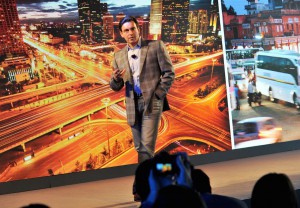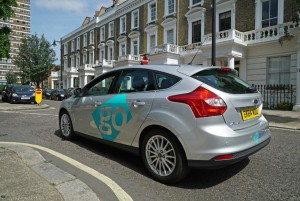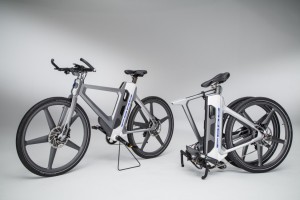
Ford CEO Mark Fields announced plans to implement some of the programs being testing in the maker's Smart Mobility plan.
Ford Motor Co. says its ready to implement some the lessons learned from a research program that delves into the changing landscape of mass mobility in era of smart phones and instant connectivity that was launched only six months ago.
Mark Fields, Ford chief executive officer, said the automakers operate pilot projects keyed to Ford Smart Mobility and move from research to the start of implementation, of new mobility products.
“We now are moving from experimentation to implementation,” said Mark Fields, Ford president and CEO, at the annual said at the annual Further with Ford trends conference in San Francisco.
“We have learned a lot in the past six months, and now are ready to put insights into action. Our goal is to make people’s lives better by helping them more easily navigate through their day, address societal issues and, over time, change the way the world moves – just as Henry Ford did more than 100 years ago,” he said.
Ford Smart Mobility is the company’s plan to deliver the next level in connectivity, mobility, autonomous vehicles, the customer experience and big data. Ford introduced the plan in January, along with 25 experiments aimed at better understanding consumers’ mobility needs around the globe. More experiments will be added in the future, Fields told reporters after his speech.
“We want to expand the services portion of our business,” he said, while acknowledging the profit potential of “smart mobility” has not been test.
But after six months of gathering data and consumer insights, Ford is prepared to focus on two strategic areas: flexible use and ownership of vehicles and multimodal urban travel solutions.

One of Ford's new mobility programs is GoDrive in London. The company has 50 electric vehicles available at 20 locations for rent.
In the flexible ownership initiative, Ford Credit is inviting 14,000 customers in six U.S. cities and another 12,000 in London to sign up to rent their Ford Credit-financed vehicles to prescreened drivers for short-term use, offsetting monthly vehicle ownership costs. U.S. customers participate through the Web-based, mobile-friendly software of ride-share company Getaround, while London drivers connect through a similar rental system of easyCar Club.
The pilot program is being offered to select Ford Credit customers in California – including Berkeley, Oakland and San Francisco; as well as in Portland, Oregon; Chicago and Washington, D.C. and initially runs through November.
(Ford outlines plans for autonomous vehicles. For more, Click Here.)
Fields said that younger buyers under the age of 35 from the Millennial generation are interested in the “sharing economy” because they see it as a way of holding down costs. Ford’s initiative will also expand consumer awareness of the fact you can rent out your car the same way you can rent out your house or vacation home.
New findings from research company, Penn Schoen Berland, indicate one third of Millennials in the United States are interested in renting out their belongings as a way to supplement their income and young Americans rank car rides second only to book lending as things they are most open to sharing. In addition, more than half of Millennials report being open to sharing rides with others.

Ford is making its new electric bike available as part of a rental program. The MoDe:Flex breaks down for easy storage and charges in that position as well.
Ford’s second initiative, GoDrive, involves an on-demand, public car-sharing pilot. The service offers customers flexible, practical and affordable access to a fleet of cars for one-way journeys with easy parking throughout London.
(Click Here for details about Ford’s introduction of its Smart Mobility plan.)
The new pilot will start with a small fleet 50 cars positioned in 20 locations. It will feature one-way trips with guaranteed parking; pay-as-you-go, per-minute pricing covers all fees and utilizes zero-emission Focus Electric vehicles, which means the vehicles can operate throughout metropolitan London.
Fields said Ford is also Ford is looking for solutions for urban commuters and revealed a new electric bike and a prototype smartphone app that makes using the eBike even easier for urban commutes.
MoDe:Flex is Ford’s third, most versatile eBike yet – easily reconfigurable for different customer needs. The bike folds and stores inside any Ford vehicle – where it can be charged while stowed.
Like the MoDe:Me and MoDe:Pro eBikes introduced in March, MoDe:Flex connects seamlessly with a rider’s smartphone thanks to the MoDe:Link app. The app harnesses real-time information regarding weather, congestion, parking costs, time, traffic and public transportation. It includes eyes-free navigation, route planning, and health and fitness information.
It also helps to identify the most efficient mode of transport for a specific journey.
A new extension of MoDe:Link for the smartwatch brings all of the real-time data and functionality to the eBike rider’s wrist. This includes the “no sweat” mode, which increases electric pedal assist based on heart rate – ensuring riders gets to their destinations without breaking a sweat.
(To see more about Ford partnering with Microsoft on more programs, Click Here.)
The wearable device also provides safety notifications. Hazards, such as potholes ahead, are signaled through vibrating handlebars, plus the smartwatch alerts the rider using beeps.

I’m betting these initial programs will not be commercially profitable. What will be profitable is providing “big data” to consumers while in motion so that more drivers can be distracted and cause more accidents.
If you can’t engineer hybrids or electrics, you may as well add another loser idea to the list.
I will bet that Ford is going to use all 50 of the crap electric cars that nobody wants so they will have another disaster to use as a tax dodge.